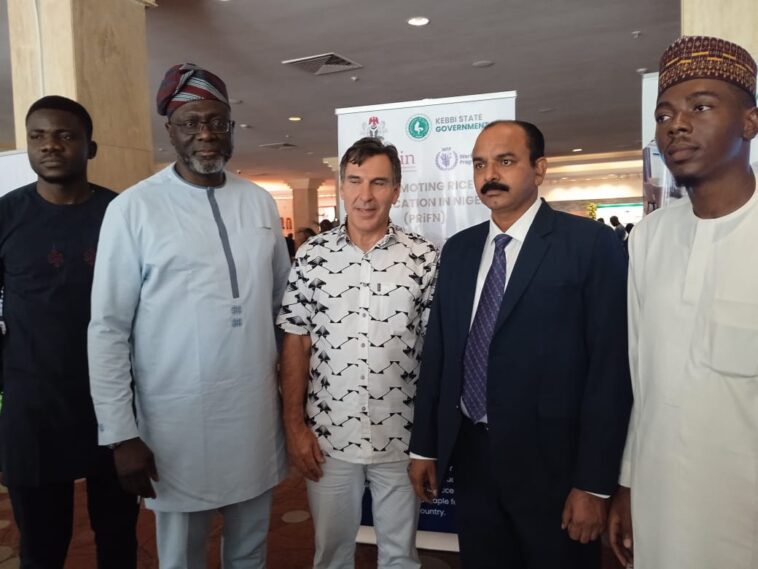Micronutrient Fortified Rice
Revolutionizing Child Nutrition: Micronutrient Fortified Rice Takes Center Stage in School Feeding Program
Micronutrient Fortified Rice offers a powerful solution to combat malnutrition and enhance the well-being of children in Nigeria’s school feeding program.
Micronutrient Fortified Rice: A Breakthrough in Tackling Malnutrition in Nigeria’s School Feeding Program
By Ava Roberts, Nigeria NewsBurrow Press Team
In a country as vibrant and diverse as Nigeria, where culture, tradition, and cuisine play a significant role in daily life, it’s crucial to address one of the most pressing issues that has silently plagued the nation for years: malnutrition among its children. Stakeholders and experts are now urging the Federal Government to take a bold step by introducing newly launched micronutrient fortified rice into the Home-Grown School Feeding program. The need is not just pressing; it’s alarming, and addressing it promptly can make a world of difference.
Dr. Michael Ojo, the Country Director of Global Alliance for Improved Nutrition (GAIN), couldn’t have emphasized this more. With unwavering concern, he has pointed out that the lack of essential micronutrients among children in Nigeria can lead to devastating consequences, including malnutrition. Micronutrients like zinc, iron, folic acid, and vitamin B12, which are not adequately present in the daily diet, play a pivotal role in a child’s health and well-being. Take folic acid, for instance; it’s critical for the production of red blood cells, and its deficiency can lead to anemia, especially in women and children who lose blood during menstruation.
The story of micronutrient-fortified rice goes beyond mere supplementation. It’s about making a lasting impact on the lives of children in Nigeria, especially those from less privileged backgrounds. The statistics are a stark reminder of the magnitude of this issue. According to the World Bank, Nigeria loses a staggering $1.5 billion in Gross Domestic Product (GDP) annually due to micronutrient deficiencies. This is not just a health crisis; it’s an economic one as well.
Mr. David Stevenson, Country Representative of the United Nations World Food Programme, highlights the potential of Nigeria’s Home-Grown School Feeding program. With one of the largest programs in Africa, it has the capacity to reach a remarkable 10 million children. The plan is simple but powerful: fortify rice with essential micronutrients and provide it to school children as part of the home-grown school feeding initiative. The goal is to ensure that every one of those ten million children can reach their full potential, both in terms of health and academic performance.
It’s not just about tackling malnutrition; it’s about transforming the future of a nation. A well-nourished child is more likely to excel in school, grow up to be a productive member of society, and contribute to the country’s economic development.
One aspect of this initiative that stands out is its cost-effectiveness. Neera Kumar from WACOT Nigeria Limited emphasizes that the fortified rice is not significantly more expensive than regular rice. In fact, the cost difference is minimal, almost negligible. It’s a small investment with a potentially enormous return in terms of improved child health and overall economic growth.
Moreover, the Kebbi state government’s decision to introduce fortified rice into the school feeding program is commendable. It’s a step in the right direction that will benefit countless children, particularly those who need it the most. This move exemplifies the importance of collaboration between governments and the private sector in driving change.
The story doesn’t end here. The value chain created by micronutrient fortification doesn’t only boost local production and economic development; it also ensures the availability of nutritious food for consumption, ultimately improving the health and well-being of children across Nigeria.
As we delve deeper into the world of micronutrient fortified rice, one thing becomes crystal clear: this is not just a health intervention; it’s a transformational journey for Nigeria. It’s an opportunity to rewrite the narrative for millions of children, giving them a chance at a brighter and healthier future.
In conclusion, the introduction of micronutrient fortified rice into Nigeria’s school feeding program is a game-changer. It’s not just about addressing malnutrition; it’s about revitalizing the nation’s potential, one well-nourished child at a time. The economic benefits, the social impact, and the health improvements are all interconnected, making this initiative a beacon of hope for a better Nigeria.
We invite you to share your thoughts on this critical issue. Join the conversation and let us know your views. Together, we can work towards a healthier, brighter future for Nigeria’s children.
This article has been brought to you by Nigeria NewsBurrow Press Team. Join the conversation and leave your comments below.
Stay tuned for more updates on this vital topic and other pressing issues in Nigeria.
[ad_1]
Are you concerned about the health and well-being of children in Nigeria? In the face of alarming malnutrition rates, there’s a pressing need for effective solutions. The introduction of micronutrient-fortified rice in the Home-Grown School feeding program is a significant step in the right direction.
This fortified rice, enriched with essential micronutrients like zinc, iron, folic acid, and vitamin B12, holds the key to addressing the critical lack of these elements in children’s diets. These micronutrients play a pivotal role in overall health, particularly in the production of red blood cells. Anemia, a condition resulting from insufficient red blood cells, is unfortunately widespread, particularly among women and children. The availability of these vital nutrients can make a substantial difference in their lives.
Imagine a future where ten million children in Nigeria benefit from fortified rice daily, courtesy of the Home-Grown School Feeding program. This ambitious endeavor can transform lives, ensuring that children reach their full potential, both physically and academically. And the positive impact extends beyond the individual, as it’s estimated that Nigeria loses a staggering $1.5 billion in Gross Domestic Product (GDP) annually due to micronutrient deficiencies. The introduction of fortified rice is a proactive step toward rectifying this issue, providing immense benefits, especially for disadvantaged children.
This article takes a closer look at the introduction of nutrient-rich rice into school feeding programs, addressing malnutrition, and improving the well-being of children. As you read on, we’ll also introduce you to a selection of affiliate products that can complement this initiative and support your efforts to make a difference. Together, we can build a healthier and brighter future for Nigeria’s children.
Stay with us as we explore how this initiative can positively impact children’s lives and discover products that align with this vision.
[ad_1]
Shop Products On Amazon










[ad_1]
Shop Products on Ebay









[ad_1]
Trending Similar Stories in the News
Malnutrition: Stakeholders Urge FG To Introduce Micronutrients News Agency of Nigeria...
Particles for Humanity Presented Poster at Micronutrient Forum Yahoo Finance...
[ad_1]
Trending Videos of Micronutrient Fortified Rice
WATCH: The reality of malnutrition among children
Impact Solution – Malnutrition: From Innovation to Impact
[ad_2]
Revolutionizing Child Nutrition: Micronutrient Fortified Rice Takes Center Stage in School Feeding Program
Similar Posts, Popular Now
Revolutionizing Healthcare: Zipline’s Medical Drone Delivery Takes Flight in Kaduna, Nigeria
Breaking Down Kano State’s Ambitious 2024 Budget: Education and Health in the Spotlight
New REC Dr. Anugbum Onuoha Takes Charge in Adamawa North Senate Replacement
Nigeria’s Electoral Reforms: Charting a Clear Path Forward
cassava farming, farm inputs distribution, Edo State agriculture, food security, rural income, agricultural development, collaborative efforts, cassava cuttings, NPK fertilizers, agricultural community, Edo farmers, sustainable agriculture






Revolutionizing Child Nutrition: Micronutrient Fortified Rice Takes Center Stage in School Feeding Program
💬 What’s your take? Drop a comment below! ⬇️
#BreakingNews #LatestUpdate #StayInformed
📖 Read More: https://tinyurl.com/24gc5rr4